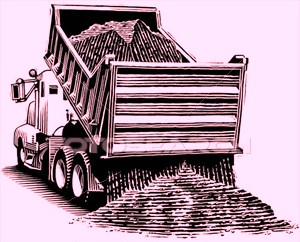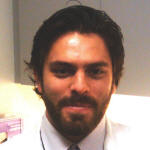| By: Paul S. Cilwa | Viewed: 4/18/2024 Posted: 11/30/2010 |
Page Views: 5072 | |
| Topics: #NaturalHealth #ColonicIrrigation | |||
| I begin to let old things go. | |||
 It isn't always easy to let go of things that no longer serve us,
especially if they were once treasured and have been held onto for
years.
It isn't always easy to let go of things that no longer serve us,
especially if they were once treasured and have been held onto for
years.
That's the lofty thought that came to mind as I lay on the table at the hydrocolonic clinic having my gut flushed out by gallons of water.
This was my second hydrocolonic at the SCNM clinic, associated with the Southwest College of Naturopathic Medicine that my husband, Michael, attends. But I wasn't there for him. I was there for me, under the guidance of Dr. Walter Crinnion and his students, as part of a program whose end goal is to rid my body of toxins accumulated during 59 years of living on Earth, a planet only recently noted for its toxic environment.
My first visit here, last week, had been relatively pleasant. Shelley, the colonic irrigation technician, had been comforting, respectful and supportive; and the actual experience hadn't been any more uncomfortable than the sensation of fullness one experiences after, say, an amazing Thanksgiving dinner.
However, Shelley's assessment at the time was that many more colonics would be needed in order to really loosen mucoid plaque, a sheath of ancient accumulated material that adheres to the inner wall of the upper intestine. This sheath hangs on to toxins, parasites, and all kinds of junk the colon couldn't quite figure out what to do with.
"Most people think of the colon as an organ of elimination," Shelley remarked
as she adjusted her equipment. "But it's actually an organ of
absorption.
 And it's coated
with a layer of mucous, just like the sinuses. And just as your nose can become
clogged with dried mucous, so can the intestines. Now, normally, that dried
mucous would be eliminated along with other materials. But if you eat
breads or sugary foods, they form a paste that traps the mucous, which then
builds up and up through the years. Eventually, nutrients can no longer pass
through it, so you start eating more and more in a desperate attempt to obtain
enough nutrients through gaps in the sheath to survive. Meanwhile, the refined
carbohydrates in what you eat, which are absorbed in the stomach where there is
no sheath, make it right to your waistline. So waste becomes waist."
And it's coated
with a layer of mucous, just like the sinuses. And just as your nose can become
clogged with dried mucous, so can the intestines. Now, normally, that dried
mucous would be eliminated along with other materials. But if you eat
breads or sugary foods, they form a paste that traps the mucous, which then
builds up and up through the years. Eventually, nutrients can no longer pass
through it, so you start eating more and more in a desperate attempt to obtain
enough nutrients through gaps in the sheath to survive. Meanwhile, the refined
carbohydrates in what you eat, which are absorbed in the stomach where there is
no sheath, make it right to your waistline. So waste becomes waist."
So, with the plastic hose having been inserted into my butt, she allowed warmed, filtered water to pour into my ensheathed colon and the fun began.
Unlike last time, I almost immediately experienced cramping. She shut off the flow and allowed the water that had come in, to go out. It took with it considerable quantities of material, all visible through the device's glass tube. At first it looked like fairly normal feces. But as the minutes passed, the material began to more closely resemble river mud.
"What the heck is that?" I asked.
"That's pretty old stuff," Shelley replied. "It's unusual for a patient to let go of so much old stuff in just a second session. This is making your colon so happy."
My colon was apparently happier than I was. I began short-breathing to distract myself from the discomfort. "Take deep breaths," Shelley advised. "When your lungs expand, they put pressure on your intestines from a different angle and that can contribute to your cleansing process."
I felt an odd urge to cry, though I wasn't in any real pain. I mentioned it.
"A lot of people getting cleanses go through catharsis," Shelley explained. "What's great is when people come to me directly from a session with a therapist. When they let go of emotional crap they've been carrying for years, the colon seems more willing to let go of the physical crap, too." I felt a sudden, hard cramp and the flow tube showed a gush of blackish-brown mud flush through. "Have you been going through therapy?" Shelley asked me.
"Not really," I replied. But the thought occurred to me, maybe I had, in an unofficial way. I had spent a couple of weekends camping with our friend, Jason. Jason and his partner, Mike, had shared Thanksgiving with us. Mike doesn't really like camping, and Michael has been too busy with school, so Jason and I went together and had spent hours complaining how our lives had turned out, how differently from what we'd hoped for a decade earlier. In fact, our conversation had become quite personal and we'd shared some disappointments that we'd scarcely been willing to acknowledge before, even to ourselves. Surprising even ourselves, we'd both gone so far as to shed tears. We marked it down to the therapeutic effects of the water at the hot spring. But the fact was, I had loosened a lot of emotional issues with which I had never really previously dealt.
So today's dumping of physical toxins might, indeed, be related to the weekend's dumping of emotional toxins. In the naturopathic world, such connections are not only considered unsurprising, but are in fact expected.
Shelley, staring at the flush tube, suddenly said, "You've got a lot of black sand!"
"Sand?" I used to be a lifeguard, but I was pretty careful not to eat the beach.
"Not real sand," she laughed. "It's metal grit. This is what Dr. Crinnion has been trying to pull out of your body. You're taking chelation therapy, right?"
"Yes," I replied. "In fact, I have my last chelation IV this evening." Chelation is a process where a metal friendly chemical is inserted into the bloodstream; it then binds with all the heavy metal molecules it can find.
"Well, be sure and tell him I spotted a lot of black sand. That means the chelation therapy is working; he'll be glad to know."
So, after 45 minutes of filling and flushing, filling and flushing, Shelley removed the tube from my butt and I headed to the private bathroom associated with the room, where I allowed the last of anything that wanted to go, to go.
It was now slightly more than an hour after I arrived, I returned to the waiting room to await my appointment with Chris Deszynski, Dr. Crinnion's student doctor. In a few minutes, Michael came in to say hello, and I invited him to come on into the examination room with me. Chris, with associate student docs Francisco and Christine, showed up moments later and we all trooped to the examination room.
 My
vitals were taken—me with the lowest blood pressure they'd yet recorded from
me, 117/75—and Chris remarked at how low it was. "I've spent a lot of time at
the hot springs," I confessed. "It's pretty relaxing. Plus, I just had that
hydrocolonic Dr. Crinnion prescribed. Oh, and Shelly said to tell you I had a
lot of black sand."
My
vitals were taken—me with the lowest blood pressure they'd yet recorded from
me, 117/75—and Chris remarked at how low it was. "I've spent a lot of time at
the hot springs," I confessed. "It's pretty relaxing. Plus, I just had that
hydrocolonic Dr. Crinnion prescribed. Oh, and Shelly said to tell you I had a
lot of black sand."
Chris found that exciting, and repeated Shelley's explanation of the significance—that the "sand" meant the chelation IVs were actually working—as he and Francisco prepared the tube of chelating chemicals for insertion. Dr. Crinnion himself arrived just before Chris managed to stick the IV needle into the appropriate vein on his first try.
"When are you going to start detox therapy?" Dr. Crinnion asked Michael.
"As soon as possible," Michael promised.
"So I hear there's black sand in your colonic discharge," the doctor said to me, while Chris slowly pushed the chemicals into my bloodstream. "That sand is the lead we've been trying to leech from your body. This is your last IV scheduled, right?"
"Yes," I agreed. "Number five. As prescribed."
"Well, if you still have black sand in your gut, there's plenty more to go. So I recommend you sign up for another five IVs. We don't even have to re-test. The lead particles in your gut is proof enough."
Dr. Crinnion said goodbye to me and Michael and left, closing the door behind him.
"I'm glad we're not done," I told Chris. "I feel like there's still metal in me. I can't explain how, but I feel it somehow."
Chris shrugged. "A lot of people go through a year of therapy to get all the toxins out. You've only been doing this for, what, three or four months? Since you started?"
"Wow," I said. "It feels longer. But, four months, tops."
I had not realized I would spend a year of my life detoxing. But it makes sense. I'd been absorbing these toxins for 59 years; they weren't going to pop out in the first few months of prying them loose.
On the way out, I made five more appointments for chelation therapy IV sessions. Only one would be with Chris, who has become my friend. He is moving on to another clinic in January, and will receive his doctorate and become a full-fledged doctor in June. His assisting in me dumping my toxins has contributed to his medical knowledge, as has my supporting Michael as he attends school. I may not have the aptitude to be a doctor, myself, but at least I can help others along their path.
And it's nice to know my toxic droppings are neither going to waste…nor waist.





